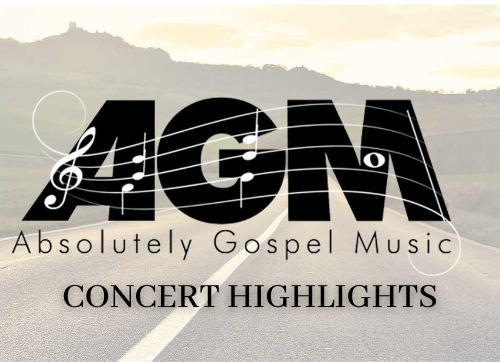Jimmy Jones: The Common Man
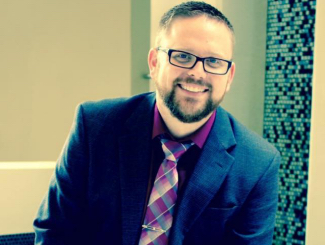
“Please let us understand that the hope of America lies in our faith in God and the common man.” – Jimmy Jones
 One of the first southern gospel singers I had the privilege of seeing and hearing was Jimmy Jones. As I grew older and became more acquainted with this classy gentleman, I became a fan of not just the good, consistent singer, but of the good, consistent, Godly man. Jimmy did not achieve as many of the accolades of a lot of his peers, but anyone who had the privilege of encountering him walked away a fan for life. Perhaps his greatest attribute was not his talent, but instead his kind nature. He clearly viewed himself as a “common man”. He certainly presented himself as one, yet his numerous talents, combined with his humble approach, presented him to his many fans and friends as nothing less than extraordinary.
One of the first southern gospel singers I had the privilege of seeing and hearing was Jimmy Jones. As I grew older and became more acquainted with this classy gentleman, I became a fan of not just the good, consistent singer, but of the good, consistent, Godly man. Jimmy did not achieve as many of the accolades of a lot of his peers, but anyone who had the privilege of encountering him walked away a fan for life. Perhaps his greatest attribute was not his talent, but instead his kind nature. He clearly viewed himself as a “common man”. He certainly presented himself as one, yet his numerous talents, combined with his humble approach, presented him to his many fans and friends as nothing less than extraordinary.
 Singing was in Jimmy Jones’s blood. He was born on February 5, 1921, on a small farm in Scottsdale, Kentucky, the ninth of eleven children into a singing family. He spent his youth singing with The Midget Quartet. He served his country in the US Army Medical Division during the Second World War. Upon his discharge in 1944, he earned his first “big break” in music when he joined Odis Echols’ Melody Ranch Boys, based out of Hot Springs, Arkansas. The group eventually evolved into Odis Echols’ Melody Boys Quartet. Jimmy spent the remainder of the 1940s traveling alongside other young emerging talents such as Doy Ott, Vernon Bright, and Earl Terry.
Singing was in Jimmy Jones’s blood. He was born on February 5, 1921, on a small farm in Scottsdale, Kentucky, the ninth of eleven children into a singing family. He spent his youth singing with The Midget Quartet. He served his country in the US Army Medical Division during the Second World War. Upon his discharge in 1944, he earned his first “big break” in music when he joined Odis Echols’ Melody Ranch Boys, based out of Hot Springs, Arkansas. The group eventually evolved into Odis Echols’ Melody Boys Quartet. Jimmy spent the remainder of the 1940s traveling alongside other young emerging talents such as Doy Ott, Vernon Bright, and Earl Terry.
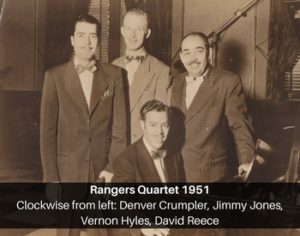 In 1951, the Rangers Quartet was involved in an automobile accident, killing their baritone singer Erman Slater and injuring bass singer Arnold Hyles to the point that he would be out of commission for several months. Jimmy traveled across the country for two years singing alongside lead vocalist Vernon Hyles, baritone/pianist David Reece, and beloved tenor Denver Crumpler during part of the heyday of one of gospel music’s greatest quartets. During Jimmy’s tenure with the group, the Rangers were heard on over 450 radio stations coast to coast through their association with Liberty Broadcasting. No gospel quartet has before or since has achieved such a high level of exposure. When Arnold Hyles was well enough to return to the road, Jimmy spent a brief period rotating between bass and baritone roles. Arnold had not completely recovered, and Vernon underwent teeth extraction during this time period, therefore the six-man lineup was well utilized for the interim, thanks to Jimmy’s versatility.
In 1951, the Rangers Quartet was involved in an automobile accident, killing their baritone singer Erman Slater and injuring bass singer Arnold Hyles to the point that he would be out of commission for several months. Jimmy traveled across the country for two years singing alongside lead vocalist Vernon Hyles, baritone/pianist David Reece, and beloved tenor Denver Crumpler during part of the heyday of one of gospel music’s greatest quartets. During Jimmy’s tenure with the group, the Rangers were heard on over 450 radio stations coast to coast through their association with Liberty Broadcasting. No gospel quartet has before or since has achieved such a high level of exposure. When Arnold Hyles was well enough to return to the road, Jimmy spent a brief period rotating between bass and baritone roles. Arnold had not completely recovered, and Vernon underwent teeth extraction during this time period, therefore the six-man lineup was well utilized for the interim, thanks to Jimmy’s versatility.
 In 1953, Jimmy moved to Atlanta, Georgia, joining his brother Brownie in forming the Deep South Quartet. This quartet, regardless of frequent personnel changes, never had a bad vocal lineup. During their brief stand in the mid 1950s, many outstanding musicians performed with the Deep South including Cat Freeman, Wally Varner, Bob Crews, David Reece, Kermit Jamerson, Tommy Rainer, Dickie Matthews, Bob Robinson, Bobby Clark, and others. While an outstanding group, the last half of the 1950s were not necessarily lucrative years for gospel quartets. Without major recording contracts or financial benefactors to keep them on the road, many of them disbanded. By 1957, the members of the Deep South had gone their separate ways.
In 1953, Jimmy moved to Atlanta, Georgia, joining his brother Brownie in forming the Deep South Quartet. This quartet, regardless of frequent personnel changes, never had a bad vocal lineup. During their brief stand in the mid 1950s, many outstanding musicians performed with the Deep South including Cat Freeman, Wally Varner, Bob Crews, David Reece, Kermit Jamerson, Tommy Rainer, Dickie Matthews, Bob Robinson, Bobby Clark, and others. While an outstanding group, the last half of the 1950s were not necessarily lucrative years for gospel quartets. Without major recording contracts or financial benefactors to keep them on the road, many of them disbanded. By 1957, the members of the Deep South had gone their separate ways.
 Southern gospel fans perhaps best remember Jimmy for his twelve year tenure with the LeFevres. As a singer and musician, Jimmy was right at home with one of the most versatile groups in gospel music history. Jimmy played bass guitar, sang baritone, and doubled at the bass position with Rex Nelon on specialty numbers. Jimmy enjoyed being part of the prime of the LeFevres’ career, as they performed on the widely televised Gospel Singing Caravan, and later The LeFevre Family Show. One of the most popular parts of their Caravan program was Poetry Corner with Jimmy Jones, as Jimmy sat in a rocking chair and shared recitations, reflecting on subjects like family and God and Country.
Southern gospel fans perhaps best remember Jimmy for his twelve year tenure with the LeFevres. As a singer and musician, Jimmy was right at home with one of the most versatile groups in gospel music history. Jimmy played bass guitar, sang baritone, and doubled at the bass position with Rex Nelon on specialty numbers. Jimmy enjoyed being part of the prime of the LeFevres’ career, as they performed on the widely televised Gospel Singing Caravan, and later The LeFevre Family Show. One of the most popular parts of their Caravan program was Poetry Corner with Jimmy Jones, as Jimmy sat in a rocking chair and shared recitations, reflecting on subjects like family and God and Country.
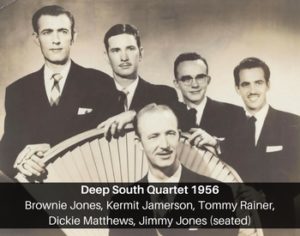 Jimmy retired from the LeFevres and full time travel in the late 1960s. I say that he retired from “travel”, rather than from music, for he still seized every opportunity possible to sing and tell his stories. He spent the 1970s singing part-time with the Good News Singers, a top notch Atlanta-based group which featured musicians such as Charles Key, Sandy Eller, and Johnny & Tony Peace.
Jimmy retired from the LeFevres and full time travel in the late 1960s. I say that he retired from “travel”, rather than from music, for he still seized every opportunity possible to sing and tell his stories. He spent the 1970s singing part-time with the Good News Singers, a top notch Atlanta-based group which featured musicians such as Charles Key, Sandy Eller, and Johnny & Tony Peace.
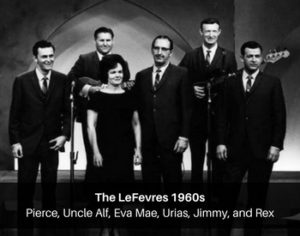 In 1983, Jimmy joined Charles Key, Hal Medlin, Steve Davis, Dave Morrison, and Don Griffin in forming The Heralds. In a feat practically unheard of even among part-time gospel groups, this Atlanta-based quartet maintained the same group personnel throughout its entire 23 year tenure. While Jimmy still claimed to be “retired”, in 1985, he joined the famous Sunshine Boys, following the passing of their longtime bass singer Johnny Atkinson. By the 1990s, he was not only performing with the two quartets simultaneously, but he was appearing on a good portion of the Gaither Homecoming videos and concerts.
In 1983, Jimmy joined Charles Key, Hal Medlin, Steve Davis, Dave Morrison, and Don Griffin in forming The Heralds. In a feat practically unheard of even among part-time gospel groups, this Atlanta-based quartet maintained the same group personnel throughout its entire 23 year tenure. While Jimmy still claimed to be “retired”, in 1985, he joined the famous Sunshine Boys, following the passing of their longtime bass singer Johnny Atkinson. By the 1990s, he was not only performing with the two quartets simultaneously, but he was appearing on a good portion of the Gaither Homecoming videos and concerts.
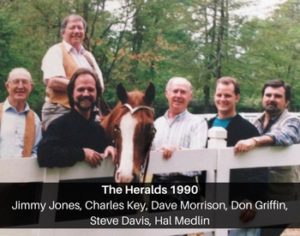 He was a recipient of the Grand Ole Gospel Reunion Living Legend Award, and was inducted into the Georgia Music Hall of Fame in 2005. He was the writer of many great songs and recitations, including “The Common Man”, “What Heaven Means to Me”, “Jesus Is My Truest Friend”, “I Won’t Have to Worry Anymore”, and “I Want to Walk with My Lord”.
He was a recipient of the Grand Ole Gospel Reunion Living Legend Award, and was inducted into the Georgia Music Hall of Fame in 2005. He was the writer of many great songs and recitations, including “The Common Man”, “What Heaven Means to Me”, “Jesus Is My Truest Friend”, “I Won’t Have to Worry Anymore”, and “I Want to Walk with My Lord”.
No gospel singer possessed a more humble or gentlemanly demeanour than Jimmy Jones. Two of my favorite Jimmy Jones stories occurred at the 2005 Grand Ole Gospel Reunion, one of his final concert appearances. Jimmy, while still carrying a grand weight of dignity, had quite a sense of humor. He always could laugh at himself, and proved such as he rendered the tender classic, “I Don’t Look Good Naked Anymore”. The entire crowd screamed with laughter. No one in the room, including his accompanist John Crenshaw, could maintain their composure. On a more serious side, later that week, as the Dove Brothers left the stage following another energetic performance, Jimmy, dressed to the nines in a tuxedo, approached Dove bass singer David Hester. Removing the rose from his lapel, he pinned it to Hester’s suit jacket while saying, “Here, I believe in giving roses while you’re alive.” Jimmy Jones endeared himself to everyone.
 On April 29, 2006, Jimmy reunited with The Heralds, The Sunshine Boys, Eva Mae LeFevre, and The Good News Singers, at Mt. Harmony Baptist Church in Carrollton, GA, where he was honored for his 60+ years in gospel music. Jimmy’s voice broke as he shared his recitation “What Heaven Means to Me” for what would be the last time. He and The Sunshine Boys brought the capacity audience to its feet with “Something Within”. And Jimmy and The Good News Singers created an atmosphere of worship as they delivered “Jesus Is My Truest Friend”. Jimmy had not made a formal announcement, but he was dying. Five weeks before his death, he passed along his advice to the next generation of singers and musicians on an informal video. With a satisfied grin and a twinkle in his eye, he closed with, “I never intentionally hurt anybody, I enjoyed my time in gospel music, and I did the best I could.”
On April 29, 2006, Jimmy reunited with The Heralds, The Sunshine Boys, Eva Mae LeFevre, and The Good News Singers, at Mt. Harmony Baptist Church in Carrollton, GA, where he was honored for his 60+ years in gospel music. Jimmy’s voice broke as he shared his recitation “What Heaven Means to Me” for what would be the last time. He and The Sunshine Boys brought the capacity audience to its feet with “Something Within”. And Jimmy and The Good News Singers created an atmosphere of worship as they delivered “Jesus Is My Truest Friend”. Jimmy had not made a formal announcement, but he was dying. Five weeks before his death, he passed along his advice to the next generation of singers and musicians on an informal video. With a satisfied grin and a twinkle in his eye, he closed with, “I never intentionally hurt anybody, I enjoyed my time in gospel music, and I did the best I could.”
Jimmy passed away on June 12th following a battle with cancer. He was 85. In 2007, he was deservedly inducted into the Southern Gospel Music Hall of Fame.
I am a better man thanks to Jimmy Jones. I will forever regret not telling him in person what his life meant to me.
 Once again, thank you for your kind words! I also must, as Jimmy Jones, “give roses” and thank my friend and photo guru Jeff Turner for jumping in at the eleventh hour in helping me get pictures together for this month’s article. I met Jeff through the We Love Our Southern Gospel Music History Facebook page, and marvel at his collection of old photos of gospel music artists. Speaking of such, I hope that many of the WLOSGMH members will make an effort to attend their convention coming up at the end of this month, March 27-28, at the Clarion Inn in Murfreesboro, Tennessee. My friends Harold Timmons, John Crenshaw, Ann Downing, and Hannah Kennedy, always put together a delightful time for those who love our music and its heritage. If you can attend on March 27-28, GO! You’ll be glad you did!
Once again, thank you for your kind words! I also must, as Jimmy Jones, “give roses” and thank my friend and photo guru Jeff Turner for jumping in at the eleventh hour in helping me get pictures together for this month’s article. I met Jeff through the We Love Our Southern Gospel Music History Facebook page, and marvel at his collection of old photos of gospel music artists. Speaking of such, I hope that many of the WLOSGMH members will make an effort to attend their convention coming up at the end of this month, March 27-28, at the Clarion Inn in Murfreesboro, Tennessee. My friends Harold Timmons, John Crenshaw, Ann Downing, and Hannah Kennedy, always put together a delightful time for those who love our music and its heritage. If you can attend on March 27-28, GO! You’ll be glad you did!
And if you wish to contact me, please feel free to email me at akendall83@aim.com. Thanks and see you soon!

